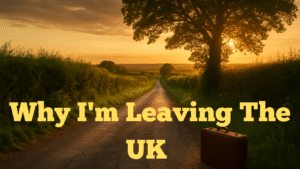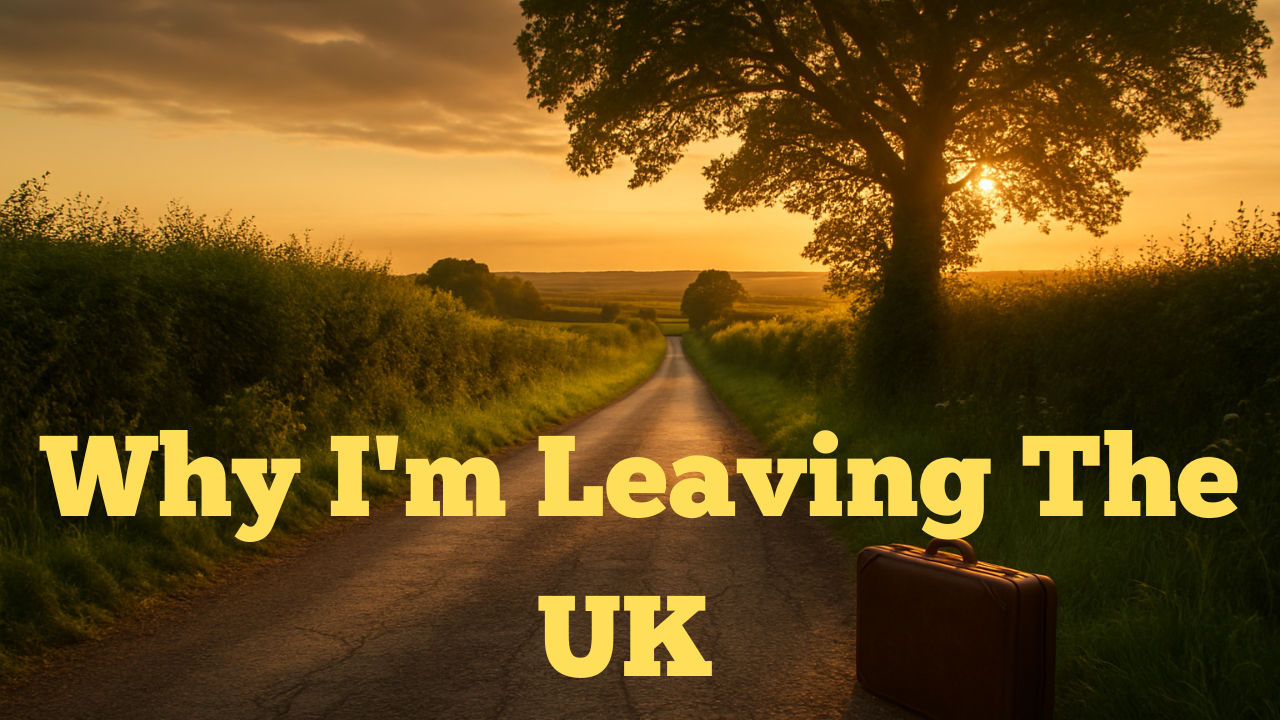
The title of my blog post and video today is, why I’m leaving the UK. I never thought I would write this. For as long as I can remember I’ve loved the English countryside: quiet lanes, hedgerows, oak trees, market towns, and the rhythm of life that follows the seasons. I’ve been involved in agriculture and the rural economy most of my life. It shapes how you think, how you work, and how you treat people. That is why this decision has not been taken lightly: I am preparing to leave the UK.
This post expands on the points I shared in my recent video. It is not a rant; it is an honest account of what I’m seeing and why the place I love feels increasingly unfamiliar. I’m sharing it because many of you have told me you are noticing similar trends in your own towns and villages.
What I’ve Always Loved
The beauty of Britain is not only in its landscapes but in its communities. I think of small farms, country churches with bells on a Sunday, neighbours helping neighbours, and the understated courtesy that used to mark public life. The photo at the top—a classic rural scene—captures what I’ll always treasure about this country. Those things are still here in places, but they are being squeezed.
What’s Changed—and Why I’m Considering Leaving
Below are the main areas where the pressure is building. You may disagree with some of it, but this is my lived experience and what many people tell me privately.
1) The Decline of Farming and Rural Britain
Farming is a way of life, not a quick route to riches. Costs are up across the board (fuel, feed, compliance), and many small farms are finding the books simply don’t balance. You see it in shuttered farm gates, machinery sold off, and the next generation deciding it’s not worth the struggle. When agriculture weakens, the whole rural web weakens—contractors, engineers, livestock markets, local shops, village schools, and even the village pub feel it.
On social media I keep seeing stories of family farms trapped by complicated schemes, changing rules, and liabilities that would take a lifetime to clear. Whether every number quoted online is exact or not, the pattern is painfully clear: more closures, fewer independent family holdings, and a quiet hollowing out of the countryside.
2) Village Life Thinning Out
There was a time when the village shop, the post office, the bus route, and the local surgery formed a dependable backbone. Today many of those services are reduced or gone. People without a car are at a disadvantage, and older residents are left with call-back systems and online forms instead of a friendly face.
3) Free Speech and the Public Square
Britain has prided itself on robust debate and plain speaking. Increasingly, people feel they must self-censor. I regularly hear of ordinary folk who get into trouble for saying things that were considered common sense ten years ago. You may have seen the same clips I have—flags handled one way in one context and differently in another; protests where some viewpoints seem welcome and others are policed. Whatever your politics, this is not healthy for a free country.
4) Cost of Living and Energy
Energy prices have bitten hard. Heating a rural home, running a small business, or keeping a farm moving has become far more expensive. When transport costs rise and electricity bites, everything else follows. You can feel the squeeze in weekly food shops and in the decisions families are delaying or cancelling.
5) Health Services Under Strain
The NHS is full of hardworking staff, but access has become more difficult. Many surgeries now use triage by phone and limit face-to-face appointments. Waiting lists are longer. I recently spoke to someone who can no longer walk into their local surgery at all—everything must be arranged by phone and assessed first. That doesn’t feel like care; it feels like a barrier.
6) Housing Pressures and Social Engineering
Another change I’m seeing is the movement of people across the country at scale—often managed far away from the communities affected. Properties are bought or allocated without local say, and the fabric of towns and villages changes almost overnight. Good people are involved on all sides, but decisions imposed from the top rarely land well on the ground.
7) Borders and Security
The small-boats crisis continues. I don’t begrudge anyone wanting a safer life, but a nation must have secure borders and a fair, orderly system; otherwise public trust evaporates. That’s where we are now: people don’t trust that the system is fair, effective, or even intended to be.
8) Central Agendas vs. Local Reality
Grand projects and international targets are announced with glossy language, yet the daily effect can be higher bills, more red tape, less choice, and fewer local services. It too often feels like ordinary working people pay the price while those who design the policies are insulated from the fallout.
The Personal Bit: Why This Matters to Me
For me, this isn’t theory. I’ve worked on the land and with rural businesses. I have watched the slow erosion of livelihoods that were once sustainable. I’ve seen the change in tone—how cautious people are about speaking honestly—and I’ve felt the financial pressure that eats into every decision.
I also work online, which means I could live and serve from different places. That flexibility is a blessing. I’m taking this one step at a time, pushing doors, and being careful. I may share more about the “where” in due course, but this is the “why.”
Faith That Doesn’t Move With the Headlines
Even as I make practical choices, my hope is not in politicians. My hope is in Jesus Christ. Governments rise and fall, policies come and go, but His word does not change. These are the Scriptures I shared in the video, from the New King James Version:
Matthew 28:20
“…and lo, I am with you always, even to the end of the age.” Amen.John 14:18
“I will not leave you orphans; I will come to you.”John 14:23
“Jesus answered and said to him, ‘If anyone loves Me, he will keep My word; and My Father will love him, and We will come to him and make Our home with him.’”Romans 8:38–39
“For I am persuaded that neither death nor life, nor angels nor principalities nor powers, nor things present nor things to come, nor height nor depth, nor any other created thing, shall be able to separate us from the love of God which is in Christ Jesus our Lord.”
What Would Make Me Stay?
People often ask, “What would change your mind?” For what it’s worth, here are the kinds of things that would restore confidence:
- Practical support and stability for family farms and the wider rural economy.
- Policies that reduce energy costs and keep the lights on without punishing ordinary families.
- A genuine culture of free speech where disagreements are allowed without fear.
- Secure borders and a fair immigration system that the public trusts.
- Localism—decisions made nearer to the people they affect.
- A healthcare system that is accessible in person for those who need it, not a wall of phone lines and forms.
Have Your Say
Do you recognise these trends where you live? Are things better or worse than five years ago? I’m keen to hear from people in towns and cities as well as the countryside—please share your experiences in the comments.
Related Posts
- The Cost of Speaking Truth in Britain Today
- School Lessons Exposed
- Digital ID: Good or Bad?
- Newspapers Are Not Always Right
Final Thought
However this journey unfolds, the foundation remains the same: “The Lord is my helper; I will not fear. What can man do to me?” (Hebrews 13:6, NKJV). Thank you for reading, for praying, and for standing for truth where you are.
